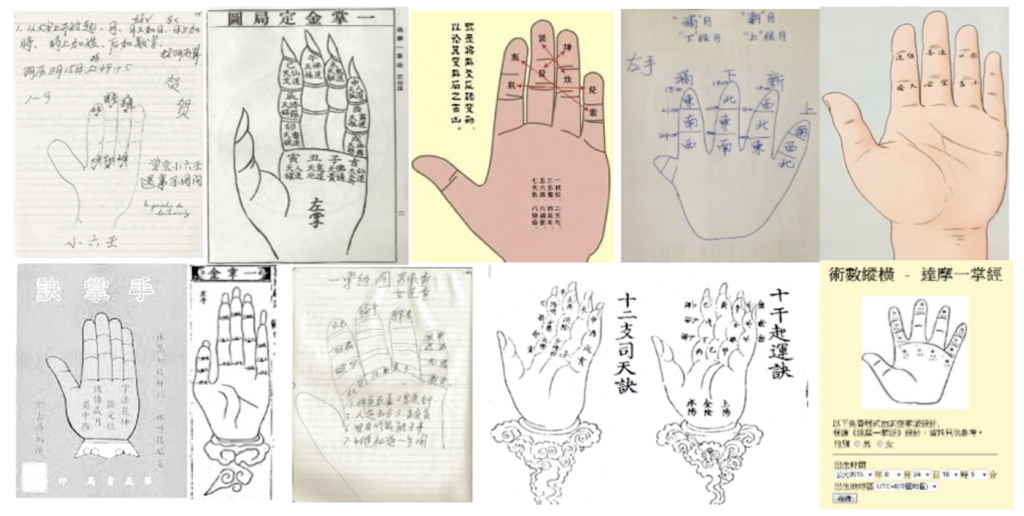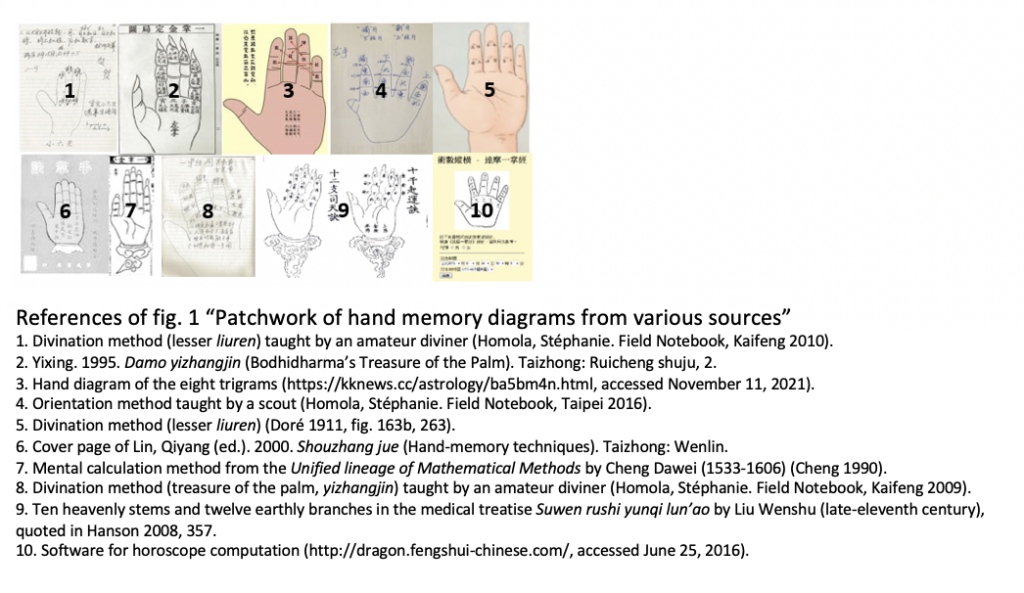CAS-E is thrilled to announce the international research project “Knowing Hands: Chinese Hand-memory Techniques & Handy Knowledge in Situ, Comparison, and Contact,” commencing in April 2025 for a duration of thirty-six months. “Knowing Hands” is a joint German–French collaboration between Prof. Marta Hanson (CAS-E Associated Scholar, Erlangen-Nürnberg) and Prof. Stéphanie Homola (French National Centre for Scientific Research, CNRS, Paris) aiming to investigate hand-memory techniques from a cross-cultural, comparative perspective. The German wing of the project is carried out at CAS-E and financed by the German Research Foundation (Deutsche Forschungsgemeinschaft, DFG) with a grant of 408.088 Euro.
Short project description here.
Knowing Hands:
Chinese Hand-Memory Techniques & Handy Knowledge in Situ, Comparison, and Contact
While looking at the Stock Exchange online, a Chinese truck-driver runs his thumb on his fingers before buying stocks. In China and Taiwan, hands are similarly used in varied contexts: with hands traditional doctors establish diagnoses, diviners compute horoscopes, and Daoist priests perform rituals. Historically, hand-memory techniques have been attested in China since the 7th c., first in Buddhist ritual practices and then in many fields: medicine, mathematics, music, poetry, law, and divination. However, they have never been connected as a common practice. How did cognitively using hands spread or decline over time in these fields? How widespread are these practices within contemporary East Asia?
The Knowing Hands project thus examines in comparative and cross-cultural perspectives unexplored historical and ethnographic material on Chinese hand-based practices. It seeks to understand both 1) how people use their hands to think with by linking hand mnemonics – what we term “epistemic hands” as a form of extended cognition, i.e., how humans use hands to aid cognitive processing; and 2) handy knowledge – “mindful hands” as a form of embodied cognition, i.e., what knowledge is grasped corporeally with hands to do things. For the first time, the project aims to link these two distinct uses of the hand: how do forms of extended cognition observed in epistemic hands inform embodied know-how in mindful hands and vice versa? We examine these practices in three ways: 1. epistemic hands in situ, historically and ethnographically in China (and spread to Japan and Korea); 2. epistemic hands in comparison between East Asian and European traditions and in contrast to mindful hands; and 3. cross-cultural Sino-European contacts about epistemic and mindful hands. Our hypothesis is that Chinese hand mnemonics are an overlooked traditional data-management tool conducive to knowledge acquisition, retention, and dissemination.
We aim to build a digital corpus of these techniques in East Asia to facilitate comparisons with scattered scholarship on European examples and contrasts with mindful hands. Based on this corpus, we first plan to trace how epistemic hands historically spread from one field to another and explain why a similar way to model knowledge was used in so many different fields. Second, just as Jesuits introduced a European hand mnemonic to the Chinese court in the 1680s and brought back a Chinese one to Europe by the 1780s, we will further explore how mindful hands – as equally complex forms of embodied knowledge, gestures, and sensitivities – also played significant roles in Sino-European exchange. Third, the project’s ethnographic lens returns to epistemic hands to examine how people from a broad socioeconomic spectrum used them to nurture their computational and reasoning abilities and develop a form of sociability that favored acquiring pragmatic knowledge. In short, the Knowing Hands project reintegrates hands into the history of knowledge.
German translation
Während er sich die Börse online ansieht fährt ein chinesischer Lkw-Fahrer mit dem Daumen über seine Finger, bevor er dann Aktien kauft. In China und Taiwan werden die Hände in ähnlicher Weise in unterschiedlichen Zusammenhängen eingesetzt: Traditionelle Ärzte stellen mit den Händen Diagnosen, Wahrsager berechnen Horoskope, und daoistische Priester führen Rituale durch. Historisch gesehen sind Techniken des Handgedächtnisses in China seit dem 7. Jahrhundert belegt, zunächst in buddhistischen Ritualen und dann in vielen weiteren Bereichen: Medizin, Mathematik, Musik, Poesie, Recht und Wahrsagerei. Sie wurden jedoch nie als gängige Praxis angesehen. Wie hat sich die kognitive Nutzung der Hände in diesen Bereichen im Laufe der Zeit verbreitet oder verringert? Wie weit sind diese Praktiken im heutigen Ostasien verbreitet? Das Projekt Knowing Hands untersucht daher in vergleichender und kulturübergreifender Perspektive bisher unerforschtes historisches und ethnografisches Material über chinesische handbasierte Praktiken. Es versucht zum Einen zu verstehen, 1) wie Menschen ihre Hände zum Denken benutzen, indem sie Handmnemotechniken miteinander verbinden – was wir als “epistemische Hände” bezeichnen, als eine Form der erweiterten Kognition, d.h. wie Menschen ihre Hände zur Unterstützung kognitiver Prozesse einsetzen; und 2) handfestes Wissen – “achtsame Hände” als eine Form der verkörperten Kognition, d.h. welches Wissen körperlich mit den Händen wortwörtlich erfasst wird, um Dinge zu tun. Das Projekt ist das erste seiner Art, das darauf abzielt diese beiden unterschiedlichen Verwendungen der Hand miteinander zu verbinden: Wie beeinflussen Formen der erweiterten Kognition, die bei „epistemischen Händen“ beobachtet werden, das verkörperte Wissen in achtsamen Händen und umgekehrt? Wir untersuchen diese Praktiken auf drei Arten: 1. „epistemische Hände“ in situ, historisch und ethnographisch in China (und ihre Ausbreitung in Japan und Korea); 2. „epistemische Hände“ im Vergleich zwischen ostasiatischen und europäischen Traditionen und im Gegensatz zu achtsamen Händen; und 3. kulturübergreifende chinesisch-europäische Kontakte über epistemische und achtsame Hände. Unsere Hypothese ist, dass chinesische Handmnemotechniken ein übersehenes traditionelles Datenverwaltungsinstrument sind, das den Erwerb, die Speicherung und die Verbreitung von Wissen fördert. Unser Ziel ist es, ein digitales Korpus dieser Techniken in Ostasien zu erstellen, um Vergleiche mit der verstreuten Forschung zu europäischen Beispielen sowei eine Gegenüberstellung zu achtsamen Händen zu ermöglichen. Kurz gesagt, das Projekt Knowing Hands integriert die Hände wieder in die Geschichte des Wissens.










